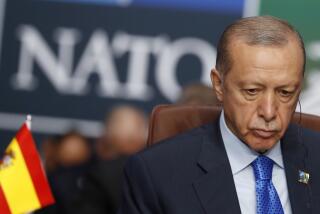Lawmakers to Vote Again on U.S. Troops, Turkish Party Leader Vows
- Share via
ANKARA, Turkey — Vowing that his country would not remain idle during a war in Iraq, the leader of Turkey’s ruling party indicated Tuesday that parliament would be asked to reconsider its refusal to support a U.S. assault against Iraqi President Saddam Hussein.
The remarks by Recep Tayyip Erdogan to his Islamist party’s legislative group were the clearest sign yet that the surprise rejection by parliament Saturday might not be Turkey’s final answer to a U.S. request to admit thousands of combat troops bound for Iraq.
But other lawmakers said they were unlikely to weigh any new war plan for at least another week. It was unclear whether the Bush administration would accept such a delay.
Erdogan warned that war might lead to a breakup of Iraq and the creation of an unfriendly Kurdish state on Turkey’s southern border. He said it was time for lawmakers to set aside their “emotions” and consider the national interest.
“Turkey, for its own security and for Iraq’s territorial integrity, will not remain an observer to the developments,” he said, adding that Turkey would decide “in the coming days how it needs to intervene and which method it needs to use.”
Erdogan spoke out after armed forces chief Gen. Hilmi Ozkok urged the government to make “new arrangements” that would allow Turkish troops to enter northern Iraq in the event of war. The proposal voted down Saturday would have authorized 40,000 Turkish soldiers to cross into Iraq along with 62,000 U.S. troops.
With Turkey’s financial markets and long-standing alliance with Washington unsettled by parliament’s defiance, Erdogan has taken the lead in shaping a response. He is expected to become prime minister next week, assuming control of a government that had reluctantly yielded to U.S. pressure on Iraq only to be humiliated by parliament. The U.S. deployment request fell three votes short of the 267 required.
Prime Minister Abdullah Gul met Tuesday with U.S. Ambassador W. Robert Pearson, who said afterward that Washington was still holding out for Turkish support.
“We have hopes, as we always have had, of working closely with Turkey,” the ambassador told reporters.
Erdogan led his Justice and Development Party to victory in November’s parliamentary elections and would have become prime minister then had it not been for his 1998 conviction on charges of inciting religious hatred after he recited a poem with Islamist overtones at a rally. The new parliament has lifted a ban that prevented him from holding public office, and he will be permitted to run Sunday for a seat representing the district of Siirt, near the Iraqi border. He is widely expected to win.
Turkey’s predominantly Muslim populace opposes war on Iraq by a 4-1 margin in surveys, and that sentiment is believed to be higher in Siirt. For that reason, party officials said, Erdogan prefers to wait until voters elect him to parliament and his fellow lawmakers elect him prime minister -- a process that could last into late next week -- before risking his popularity on a new vote on playing host to U.S. troops.
As prime minister, Erdogan could rid the Cabinet of several ministers who have opposed the U.S. deployment and lobby more effectively in parliament. A delay of a week or more would also give the Bush administration time to achieve U.N. Security Council support for a war -- a step that some Turkish lawmakers say would be required before they would think about voting “yes.”
Many Turks hailed Saturday’s “no” voters in parliament as heroes, especially the more than 90 Justice and Development lawmakers who bucked the party. But pressures were building on those defectors Tuesday to change their votes. Some worried that the party’s split had weakened its grip on power.
“If the same proposal were presented to parliament today, I would say ‘yes,’ and it would definitely be adopted,” said Mehmet Elkatmis, a leading member of Justice and Development who rejected the U.S. deployment proposal Saturday. “This is because our party is now being portrayed as a party that is cracking up, and we are extremely upset by that.”
Other lawmakers who voted “no” reported protests from constituents angry that Turkey stands to forfeit $15 billion in promised U.S. aid if it bars American troops. The consequences of parliament’s decision became clear Monday when Turkey’s stock market plunged 12.4% and the government outlined painful tax increases and spending cuts to restore investor confidence.
The market recovered some of its losses Tuesday, and the currency, the lira, remained stable. But traders warned that Turkey was spared a financial crisis because investors still expected parliament to reconsider.
Some party officials have urged Washington to smooth the way for a second vote by making a clearer promise to rein in Iraqi Kurds. The Kurds have enjoyed de facto autonomy from Hussein’s regime thanks to a “no-fly” zone enforced by U.S. and British warplanes over their enclave in northern Iraq since 1991.
More to Read
Sign up for Essential California
The most important California stories and recommendations in your inbox every morning.
You may occasionally receive promotional content from the Los Angeles Times.













